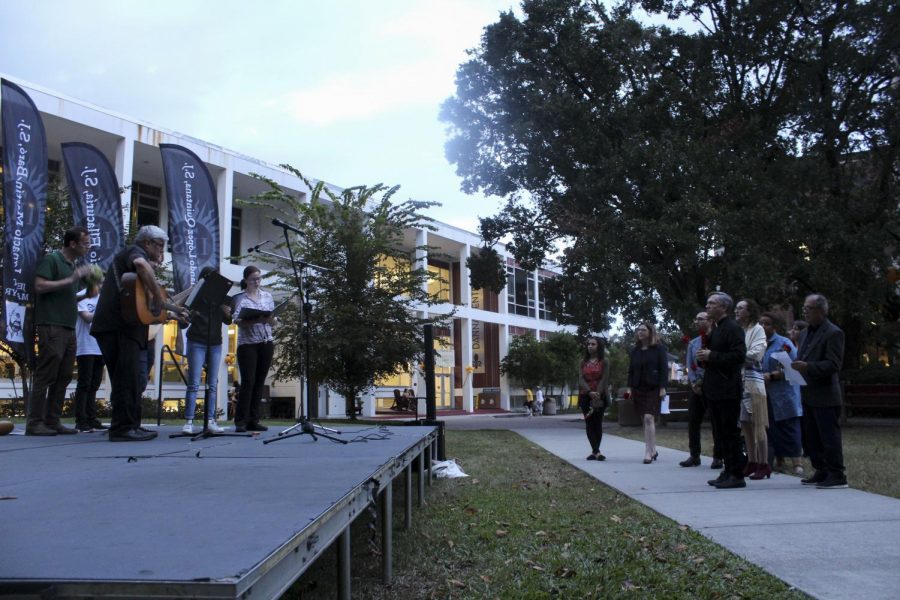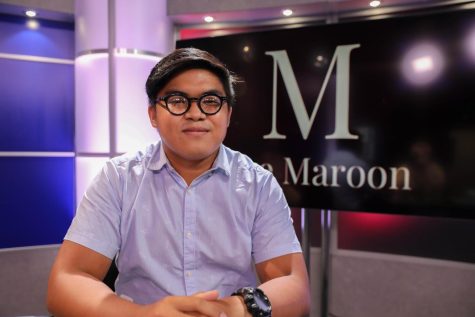Loyola honors Jesuit martyrs from El Salvador
Loyola students and faculty perform music on Nov. 11 in memory of the victims of the 1989 massacre of Jesuits in El Salvador. Six Jesuit priests and two companions were killed in the incident during the civil war that lasted more than a decade in El Salvador. Photo credit: Ver Lumod
December 8, 2019
Last month, the Jesuit community of Loyola University New Orleans commemorated the 30th anniversary of the murders of six Jesuit priests and two civilians in El Salvador.
On Nov. 16, 1989, Salvadoran Army soldiers killed Father Ignacio Ellacuría, Father Amando López, Father Ignacio Martín Baró, Father Joaquín López, Father Juan Ramon Moreno, and Father Seguno Montes, as well as housekeeper Julia Elba Ramos and her sixteen-year-old daughter Celina, in their living quarters on the campus of Central American University in the capital of San Salvador.
The Salvadoran government initially blamed the assassinations on the rebel organization Farabundo Martí National Liberation Front. The murders eventually caused international calls for a ceasefire to the civil war between the two sides in El Salvador, which later occurred in 1992.
Aside from actively advocating for the ceasefire, the Jesuit victims had also raised awareness on human rights abuses inflicted by the Salvadoran government on their poor constituents, which mainly caused the Salvadoran Army to consider them as subversives working for the Farabundo Martí National Liberation Front.
“They refused to be silent, and they also wanted to uphold social justice,” said Latin American studies professor Alvaro Alcazar.
Sponsored by the Loyola University Community Action Program (LUCAP), the week-long series of events honoring the martyrs kicked off with an interfaith service held by Student Life and Ministry as well as the Latin American Studies department on Nov. 11 in the Peace Quad, originally renamed in honor of the Jesuit priests months after the massacre.
The service featured scripture readings and hymns, as well as a reading of Father Ellacuría’s 1982 commencement speech at Santa Clara University in California, where he called for universities to enact transformative change in the real world.
“The Jesuit martyrs were killed because they talked about social justice and the dignity of all people, as well as related issues in their conversations with people and in their classes,” Alcazar said in a speech delivered on the service.
The second event, which occurred on Nov. 15, was a round table discussion of Father Ellacuría’s Santa Clara University address as well as Pope Francis’s 2017 speech to the International Federation of Catholic Universities.
The commemoration events ended with a Martyr’s Mass held in the Peace Quad on Nov. 17.
Alcazar talked about the importance of the commemoration events at Loyola.
“It is a way of honoring the characteristics of Jesuit education and living them,” he said.
Moreover, he indicated that the events are about more than appreciating what the Jesuit martyrs had died for.
“As a social justice university, it is our responsibility as citizens to seek out injustices in our community,” he continued.
Regarding the ongoing issue of religious persecution due to commitment to social justice, Alcazar said that only compassion can change things.
“In the face of injustice and persecution, our solutions must come out of love. As Dr. King said, darkness cannot take away darkness, only light can do that,” he said.
International business senior Amie Jigba, who works with LUCAP, said she wanted to raise awareness about the Jesuit killings and their importance in today’s world.
“The commemoration was important because the reason for the martyrs dying is still very prominent in today’s world,” she said. “It allows people to realize that even though it happened 30 years ago, there’s still justice to fight for.”








Alum '07 • Dec 28, 2019 at 5:30 pm
It’s good to remember these Jesuits, but I think Loyola students are done a disservice by getting a very whitewashed version of events.
In my opinion, this horrible event is an important case study for the Church in how far priests should go in supporting specific ideologies or sides in nationial and political conflicts. Of course, the Church should always stand for human rights, but should priests actively side with communists in a national conflict…..probably not? And that’s basically what was happening in El Salvador at the time. Loyola students deserve a fuller and more complex retelling of the events and why this happened. Yes, the government of El Salvador was a gang of ruthless thugs. However, replacing them with communists, would have likely made the lives of most citizens even worse (given communism’s long track record of failure and social injustice).
Joseph Edward Mulligan, SJ • Dec 10, 2019 at 8:23 pm
As a Jesuit working in Central America (Nicaragua), I am very glad to see this article about your commemoration of the martyrs of El Salvador.
Are “commercials” permitted here? Your readers may be interested in my video:
Blood of Jesuit Martyrs of El Salvador Poured on Gatepost of White House 1990
https://youtu.be/9HW73O1ElJA
29 mins.
In 1990 twenty-nine people were arrested at the White House after two, Phil Berrigan and Joe Mulligan, SJ, poured blood on the gatepost in a protest against the massacre of 6 Jesuits and 2 women at the Central American Univ. in San Salvador in 1989. Some of the blood was that of the martyrs. This video can serve as an introduction to that atrocity and as a graphic depiction of the protest at the White House, which was a denunciation of US military support for the murderous Salvadoran regime.
My other videos about these martyrs can be seen on my YouTube channel: josephmulligan1
In Christ,
Joe Mulligan, SJ